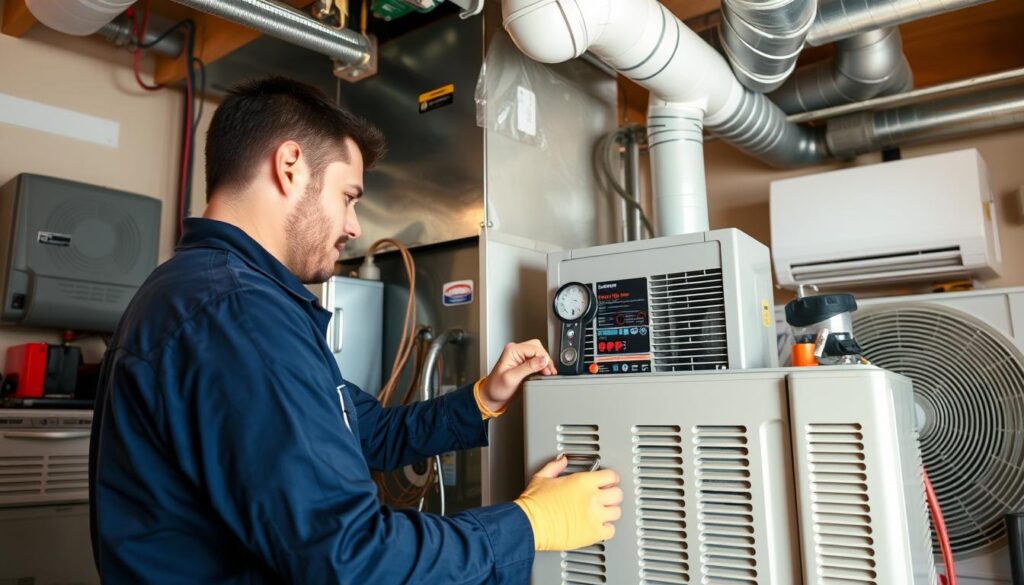Affiliate Disclosure
HVAC Guide Guys is a participant in the Amazon Services LLC Associates Program, an affiliate advertising program designed to provide a means for sites to earn advertising fees by advertising and linking to Amazon.
Can I Get Into HVAC With a GED? Are you thinking about a career in heating, ventilation, and air conditioning (HVAC)? You might wonder if a GED is enough to start. The answer is yes, a GED can open doors in the HVAC field. But what are the requirements, and how do you succeed on this path? Let’s explore the details about HVAC careers and GEDs together.

Key Takeaways
- HVAC technicians usually need a high school diploma or GED as a basic requirement.
- Many HVAC training programs and apprenticeships welcome GED holders, offering chances to grow in your career.
- For HVAC technicians, hands-on training, certifications, and state licenses are key, no matter your education.
- The HVAC industry is expected to grow 5% from 2020-2030, with a median salary of $50,590 a year.
- To thrive in HVAC with a GED, focus on technical skills, safety knowledge, and a strong work ethic.
Table of Contents
Understanding HVAC Career Requirements and GED Acceptance
Starting an HVAC career is a great choice for many. It’s a field that’s both rewarding and in high demand. A common question is if you can start with a GED instead of a high school diploma. The answer is yes, the HVAC industry accepts GEDs as a valid entry point.
Basic Educational Prerequisites
To start most HVAC programs, you need a high school diploma or a GED. This ensures you have the basic knowledge and skills needed. Both diplomas and GEDs are seen as equal by the HVAC industry.
Role of GED in HVAC Training
People with GEDs are welcome to HVAC training, which lasts from 6 months to 2 years. These programs teach you how to work with HVAC systems. Whether you have a diploma or a GED, you can start your HVAC career with the same training.
Industry Recognition of GED Credentials
The HVAC industry sees the GED as a valid alternative to a high school diploma. Employers know that a GED shows you’re serious about your education. With a GED, you can apply for HVAC jobs and apprenticeships with confidence.
| HVAC Career Prerequisites | GED Acceptance | Industry Recognition |
|---|---|---|
| High school diploma or GED | GED is widely accepted for HVAC training programs | GED credentials are recognized as equivalent to a high school diploma for HVAC careers |
Whether you have a diploma or a GED, the HVAC industry values your education and potential. With the right training and certifications, you can start a fulfilling HVAC career.
Explore Our HVAC Shop
Looking for top-rated HVAC tools, parts, and accessories? Visit our shop and find the perfect solution for your needs.
Visit the ShopCan I Get Into HVAC With a GED?
Absolutely! The HVAC industry is flexible with education. A GED is often seen as equal to a high school diploma. If you have a GED, you can start a fulfilling career in HVAC.
Many HVAC training programs accept GED holders. These programs last from 6 months to 2 years. They teach you the skills needed to work on HVAC systems.
After finishing, you’ll be ready to install, maintain, and repair HVAC systems. This ensures comfort in homes and businesses.
There are also apprenticeships for GED holders. These last 3 to 5 years. You’ll get hands-on experience and classroom learning.
During the apprenticeship, you’ll learn from experienced HVAC professionals. This is a great way to gain skills and knowledge.
The HVAC industry is growing fast. The Bureau of Labor Statistics says there will be a 5% job increase for HVAC technicians by 2030. This makes HVAC a great career choice for those looking for stability and growth.
| HVAC Career Entry Requirements | Typical Duration | Earning Potential |
|---|---|---|
| GED or High School Diploma | 6 months to 2 years | Median Annual Salary: $50,590 |
If you have a GED, the HVAC industry welcomes you. With the right training and certifications, you can start a rewarding career. Your skills and hard work can lead to job stability and growth.
Explore Our HVAC Shop
Looking for top-rated HVAC tools, parts, and accessories? Visit our shop and find the perfect solution for your needs.
Visit the ShopCareer Pathways in HVAC Technology
The HVAC (Heating, Ventilation, and Air Conditioning) industry has many career paths. This includes options for those with a GED. You can start with entry-level jobs or aim for more advanced roles.
Entry-Level Positions
At the beginning, you might look into HVAC installer or maintenance technician jobs. These roles include installing, fixing, and keeping HVAC systems running. With the right training and certifications, you can do well in these jobs.
Advanced Career Opportunities
As you get more experience, you can move up in the HVAC field. You might become a senior technician, supervisor, or even start your own HVAC business. These higher positions need more certifications, knowledge, and leadership skills.
Specialization Options
The HVAC field also lets you specialize in areas like commercial refrigeration or solar panel installation. Focusing on a niche can make you more marketable and might increase your salary. Getting specialized certifications and training can lead to these rewarding careers.
No matter where you start, the HVAC industry offers many chances for growth. With education, training, and the right certifications, those with a GED can have a rewarding HVAC career.
| HVAC Career Paths | Median Income (California) | Salary Range (California) |
|---|---|---|
| HVAC Mechanic | $48,898 | $40,399 – $60,500 |
| HVAC Supervisor | $62,400 | $52,000 – $75,000 |
| HVAC Business Owner | $78,200 | $65,000 – $95,000 |
“The HVAC field offers a wide range of career opportunities, from entry-level positions to advanced specializations. With the right training and certifications, individuals with a GED can thrive in this dynamic industry.”
Essential Training Programs and Certification Requirements
If you want to work in HVAC (Heating, Ventilation, and Air Conditioning), you need the right training and certifications. These programs teach you about heating, cooling, refrigeration, electrical parts, and how to fix problems. The time it takes to finish these programs can be from 6 months to 2 years.
Getting the EPA Section 608 Universal Certification is key for HVAC techs in the U.S. It covers various HVAC systems and shows you can handle refrigerants safely and well.
Some states, like Virginia, also need HVAC techs to have specific licenses. These can be for apprentices, journeyman, or master technicians. Getting certified can take from 6 months to 5 years, depending on the program and your goals.
Good HVAC work needs strong technical skills. This includes basic math like addition, subtraction, multiplication, and division. You might also need algebra and geometry for tasks like figuring out system loads and refrigerant levels.
| Training Program | Duration | Credential |
|---|---|---|
| HVAC Certificate Program | 6 months to 1 year | Certificate |
| HVAC Associate Degree Program | 2 years | Associate Degree |
| HVAC Apprenticeship | 3 to 5 years | Journeyman License |
Ready to start in HVAC? Contact ETI’s HVAC/R Program at (888) 830-7678. They can tell you more about their training and how it can help you reach your career dreams.
HVAC Apprenticeship Opportunities for GED Holders
If you have a GED and want to work in HVAC, you’re in luck. There are many apprenticeship programs out there. These programs mix on-the-job training with classroom learning. They’re a great way for GED holders to start their HVAC career.
Types of Apprenticeships Available
HVAC apprenticeships vary to fit different skills and interests. Some focus on general HVAC work, while others specialize in refrigeration or commercial systems. These programs aim to give you the skills and experience needed to succeed as an HVAC technician.
Duration and Requirements
HVAC apprenticeships usually last 3 to 5 years. They combine classroom learning with hands-on training. You’ll need a high school diploma or GED to start. The program covers topics like system design and maintenance.
Compensation During Training
One big plus of HVAC apprenticeships is the chance to earn while you learn. Apprentices start at a lower wage but get raises as they progress. By the end, they earn the same as a journeyman technician.
If you have a GED and dream of a HVAC career, check out apprenticeships. They offer real-world training, recognized credentials, and the chance to earn as you learn. These programs are a great way to start your HVAC career.
Explore Our HVAC Shop
Looking for top-rated HVAC tools, parts, and accessories? Visit our shop and find the perfect solution for your needs.
Visit the ShopRequired Skills and Technical Knowledge
To become an HVAC technician, you need a mix of HVAC technical skills, industry knowledge, and mechanical aptitude. HVAC pros are good at fixing things and also great with people. They manage their time well and pay attention to details.
At the heart of being an HVAC tech is knowing how HVAC systems work. This includes their parts, how they operate, and how to fix them. You’ll need to know about electrical and plumbing work. Also, using tools like multimeters and thermometers is key.
- Proficiency in reading and interpreting technical schematics and manuals
- Familiarity with HVAC equipment installation, maintenance, and repair
- Ability to diagnose and resolve system issues, including identifying and fixing leaks, adjusting controls, and replacing components
HVAC techs also need to keep up with the latest in the field. This means knowing about new energy-saving tech and following safety rules.
Being good at physical tasks is important too. HVAC work can be tough, like lifting heavy stuff and climbing high. You need to be able to solve problems and work well under pressure.
| Required HVAC Skills | Essential Technical Knowledge | Mechanical Aptitude |
|---|---|---|
|
|
|
By focusing on HVAC technical skills, industry knowledge, and mechanical aptitude, you can succeed in HVAC. It’s a field that’s always changing, but with the right skills, you can thrive.

“HVAC technicians must be skilled problem-solvers who can quickly diagnose and resolve complex issues while also providing exceptional customer service.”
State Licensing and EPA Certification Guidelines
Understanding HVAC licensing and certification is key for new technicians, especially those with a GED. The rules change from state to state. It’s important to know the specific laws and guidelines.
State-Specific Requirements
HVAC licensing rules differ across the U.S. Some places, like South Dakota, don’t require state licenses but have local rules. Others have strict rules, such as:
- Alabama: HVAC contractors need an apprenticeship certificate or 3,000 hours (18 months) of experience under a licensed contractor.
- Arizona: You must have four years of HVAC experience or two years plus an apprenticeship or course.
- California: HVAC contractors need four years of experience in the last 10, a $15,000 bond, and worker’s compensation insurance for a license.
EPA Section 608 Certification Process
All HVAC techs working with refrigerants must get EPA Section 608 certification. This EPA rule makes sure techs know how to handle refrigerants right. It helps protect the environment. The test covers refrigerant properties, recovery, and containment.
The HVAC industry is growing by 4% by 2029, says the U.S. Bureau of Labor Statistics. For GED holders wanting to join, keeping up with licensing and certification is crucial.
Explore Our HVAC Shop
Looking for top-rated HVAC tools, parts, and accessories? Visit our shop and find the perfect solution for your needs.
Visit the ShopJob Market Outlook and Salary Expectations
The HVAC job market is growing fast, with a 10% increase in jobs expected by 2028. This is much quicker than the average job growth rate. It’s because of new buildings and a focus on saving energy and being green.
HVAC technicians in the U.S. made a median of $49,630 in 2019, says the Bureau of Labor Statistics. But, salaries can change a lot. They depend on where you work, your skills, and how long you’ve been doing the job. People in big cities or expensive areas often make more.
Hourly wages for HVAC jobs range from $7.27 to $50.90, with an average of $23.45. The highest earners can make over $80,820 a year. As you get more experience, your salary usually goes up.
On top of their regular pay, HVAC techs might get bonuses, overtime, or extra pay for risky jobs. This can really boost their earnings.

In summary, the HVAC field is a great career choice. It offers good salary expectations and strong job market growth. It’s perfect for those who like working with their hands and solving technical problems.
Steps to Launch Your HVAC Career with a GED
If you have a GED, starting a career in HVAC technology is possible. By following certain steps, you can use your GED to begin a rewarding HVAC career. Let’s look at the main steps to start your HVAC career with a GED.
Initial Career Planning
First, learn about the HVAC industry and the job market in your area. Think about your interests, skills, and career goals. Look for HVAC areas that match your goals and find entry-level jobs and chances for growth.
Educational Timeline
- Get your GED, which most HVAC programs and employers accept.
- Join an HVAC training program or an apprenticeship to get practical experience and certifications.
- Get EPA Section 608 certification by passing an exam. It’s a must for HVAC techs.
Professional Development Path
- Keep learning new HVAC skills and knowledge through training and certifications like NATE.
- Keep up with the latest HVAC trends, technologies, and best practices to stay competitive.
- Look for leadership roles or start your own HVAC business as you gain more experience.
By following these steps, you can start your HVAC career with a GED. This will set you up for success in this growing and needed field.
| HVAC Training Program | Duration | Cost |
|---|---|---|
| Trade School | 1 to 2 years | $1,200 to $15,000 |
| Community College | 1 to 2 years | $3,440 per year |
| Apprenticeship | 4 to 5 years | Paid on-the-job training |
“The HVAC industry offers a salary potential of up to $80,000 per year for technicians with a high school diploma or equivalent.”
Conclusion
A GED can lead to a successful career in the HVAC industry. With the right training and certifications, GED holders can find many opportunities. The HVAC field offers stable jobs, good pay, and chances to move up in your career.
The HVAC field has a median salary of $50,590. Top earners make over $80,000 a year. From 2020-2030, there will be 5% more jobs, adding 19,000 new positions. This growth, along with accepting GEDs, makes a bright future for HVAC careers.
To start your HVAC career, get the needed training and certifications. You can work in many areas, from basic to specialized jobs. With the right skills and hard work, you can have a fulfilling and stable career in HVAC.

